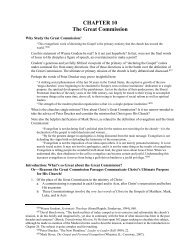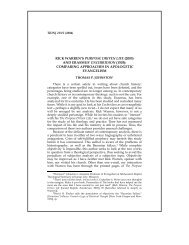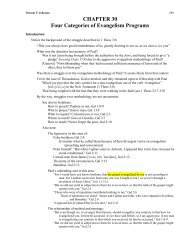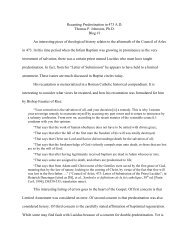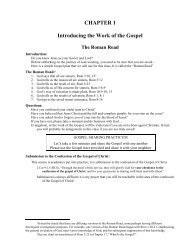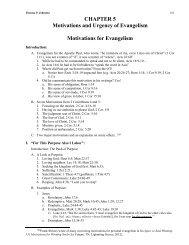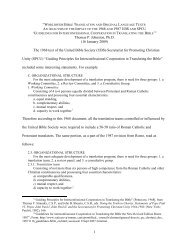CHAPTER 7 Defining Evangelizing - Evangelism Unlimited
CHAPTER 7 Defining Evangelizing - Evangelism Unlimited
CHAPTER 7 Defining Evangelizing - Evangelism Unlimited
Create successful ePaper yourself
Turn your PDF publications into a flip-book with our unique Google optimized e-Paper software.
356 Evangelizology<br />
Of the shining on the face of Stephen, just prior to his bearing witness of the Gospel to the<br />
antagonistic audience:<br />
Acts 6:15, “And fixing their gaze on him, all who were sitting in the Council saw his face like the<br />
face of an angel”<br />
Of the giving of the Law by angels/messengers:<br />
Act 7:53, “you who received the law as ordained by angels, and yet did not keep it” (cf. Gal 3:19<br />
seems to favor the use of the word “angel” in Acts 7:53)<br />
Of Paul:<br />
Gal 4:14, “and that which was a trial to you in my bodily condition you did not despise or loathe,<br />
but you received me as an angel of God, as Christ Jesus Himself”<br />
In the Gospel, commissioning, and proclamation of Paul:<br />
1 Tim 3:16, “And by common confession great is the mystery of godliness: He who was revealed<br />
in the flesh, Was vindicated in the Spirit, Beheld by angels, Proclaimed among the nations,<br />
Believed on in the world, Taken up in glory”<br />
One must confess, that from the standpoint of the Great Commission and the proclamation of<br />
the Gospel, as obeyed by messengers of the same, the translation “messengers” seems to<br />
be more appropriate in this context.<br />
Of Rahab entertaining messengers-angels (or “spies,” in Joshua 2):<br />
James 2:25, “And in the same way was not Rahab the harlot also justified by works, when she<br />
received the messengers and sent them out by another way?”<br />
Of the angels/messengers/pastors of the Seven Churches in Revelation:<br />
Rev 2:1, “To the angel of the church in Ephesus write: The One who holds the seven stars in His<br />
right hand, the One who walks among the seven golden lampstands, says this”<br />
cf. Rev 2:8, 12, 18; 3:1, 7, 14<br />
Yet, of a clear distinction between angels and the seed of Abraham:<br />
Heb 2:16, “For indeed He does not give aid to angels, but He does give aid to the seed of<br />
Abraham”<br />
7) sunergo,j (13 NT uses, listed as an adjective), meaning fellow worker, helper:<br />
1 Thess 3:2 (NKJ [following the Greek BYZ]), “and sent Timothy, our brother and minister of God,<br />
and our fellow laborer in the gospel of Christ [kai. sunergo.n h`mw/n evn tw/| euvaggeli,w| tou/<br />
cristou/,], to establish you and encourage you concerning your faith”<br />
8) su,ndouloj (10 NT uses), meaning fellow servant:<br />
Col 1:7, “just as you learned it from Epaphras, our beloved fellow bond-servant, who is a faithful<br />
servant of Christ on our behalf”<br />
9) sustratiw,thj (2 NT uses), meaning fellow soldier: 487<br />
Phil 2:25, “But I thought it necessary to send to you Epaphroditus, my brother and fellow worker and<br />
fellow soldier, who is also your messenger and minister to my need”<br />
Phm 1:2, “and to Apphia our sister, and to Archippus our fellow soldier, and to the church in your<br />
house”<br />
10) u`phre,thj: Acts 26:16, “to appoint you a minister and a witness”<br />
11) a`lieu,j, fisherman:<br />
Matt 4:19, “I will make you fishers of men”<br />
Mark 1:17, “I will make you become fishers of men”<br />
487 Notice the Louw-Nida’s seeming attempt to remove the warfare imagery of Paul in this term: “34.19<br />
συστρατιώτης, ου m: (a figurative extension of meaning of συστρατιώτης ‘fellow soldier,’ not occurring in the NT) one<br />
who serves in arduous tasks or undergoes severe experiences together with someone else – ‘one who struggles along<br />
with, one who works arduously along with, fellow struggler.’ Ἀπφίᾳ τῇ ἀδελφῇ καὶ Ἀρχίππῳ τῷ συστρατιώτῃ ἡμῶν ‘to<br />
our sister Apphia and our fellow soldier Archippus’ Phm 2 [sic]. A strictly literal translation of συστρατιώτης in Phm 2<br />
might imply that Paul himself was a soldier and therefore, in a sense, a secret agent of some military force. Accordingly,<br />
it may be necessary to employ a simile, for example, ‘who works like a fellow soldier’ or ‘one who experiences great<br />
hardships along with us’” (Louw-Nida Lexicon; from Bibleworks 8.0).



